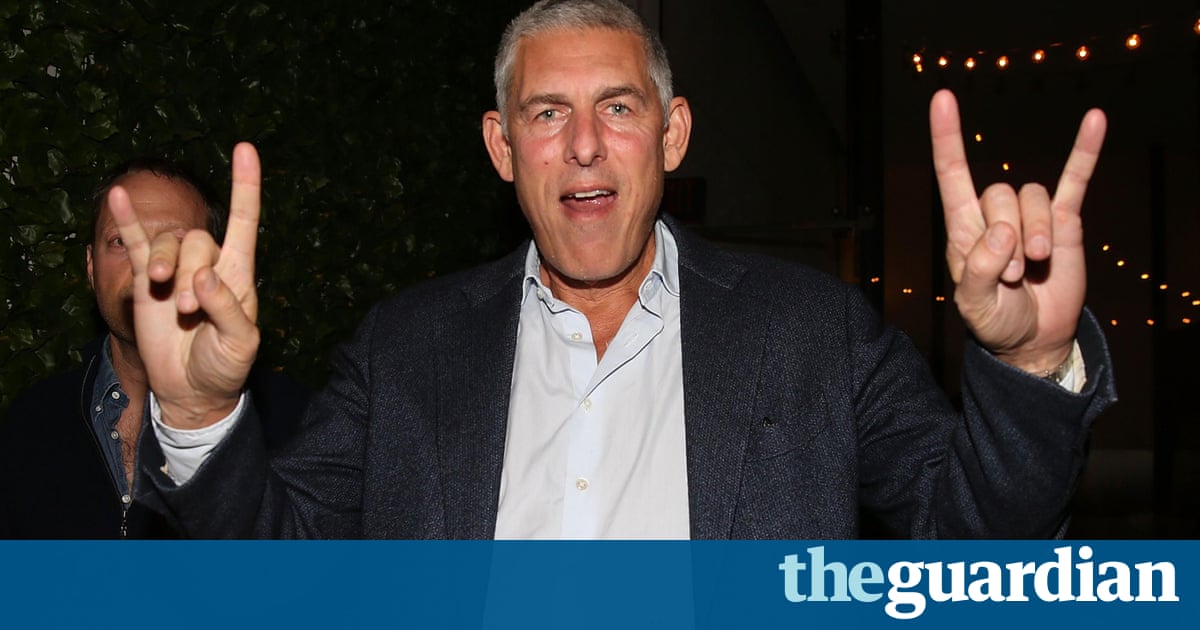He made his name with Def Jam and came through the Greek tragedy of Napster. The mogul tells the Guardian why Apples svengali was difficult to work with and how hes survived in the music business

Lyor Cohen has something of a reputation in the record business. Hes not on the same scale as David Geffen, who spent most of the 1970s on the phone screaming at people, or Walter Yetnikoff, who spent most of the 1980s inebriated and howling at the moon. Rather he is known for a curt business style, honed through three decades in the business that began in hip-hop management and touring, and was followed by a move into the label system (both independent and major).
He entered the music business just as rap was exploding and the new CD format was promising to make everyone very rich. He joined the major label system, as chief creative officer at Warner Music Group, in 2004 as the floor was falling from under the feet of labels in the wake of Napster. He left Warner just as streaming was starting to have an impact, seeing his company 300 Entertainment as a nimbler craft upon which to sail the choppy waters that the record business finds itself in today. We have some wonderful artists that are performing at Reading & Leeds Festival in the UK this August like The Hunna and Highly Suspect, he says of the steady international expansion of his roster. Fetty is going to be there and Young Thug is going to be there too. We are building, brick by brick, a roster that hopefully the gatekeepers and the fans can respect.
For the music business, as with comedy, its all about timing.
Born in 1959, he grew up in LA in a very hippy Jewish family who were into classic literature, opera and the ballet. His father, a child psychiatrist and one of the pioneers of the classroom without walls education system, gave him his first introduction to music by wiring up the record player to the intercom system in their home. Hed play Dixieland jazz and classical music non-stop, he recalls.
The family home was like a salon where artists would exhibit works and poetry readings would take place. It was very bohemian, he says. Music was the centerpiece of the experience. (His younger brother, Daniel Shulman, would go on to be the bassist in Garbage.)
He admits his parents, so immersed in the arts and liberal culture, did not give him an obvious reason to rebel, but he still found one. I am the black sheep of the family, as I am very commercial, he says. They are very learned people and the imagination of building a business or capitalism is pretty foreign to them. They are very happy with their poetry books, their granola and their nice family lifestyle. I have always been like a sailor. I go to foreign places and I put myself in awkward situations.
His initial career was, however, the least awkward you could imagine. After completing his degree in international finance and marketing, he got a job at Bank Leumi, the National Bank of Israel, in LA on a salary of $14,000 a year. He hated it and was itching to do something in music having been to see hip-hop crew Uncle Jamms Army at the Civic Centre in LA. It was the first show of its kind that brought African American kids to listen to breakbeats, he recalls.
He had the idea of putting on a late-night show where unsigned Hollywood acts like the Red Hot Chili Peppers and the Circle Jerks co-mingled with Run-DMC. Borrowing $700 from his mother, his first show was a success and made him $36,000. Confident he had the Midas touch, he rolled the dice again on a second show that proved a disaster and wiped him out.
It was less a crash course in the music business and more a crash course in life, he says, thinking back to that time. I was devastated and humiliated. This disaster was to define the rest of his career. I remember the feeling of extreme pain below my heart and above my stomach. It was so acute that it is really one of the pains and feelings that I have run from my entire life.
His shows brought him to the attention of Russell Simmons, then running the Rush management company and looking after the cream of east coast hip-hop, who invited him to come to New York and work for him. While his father cautioned him to get a proper contract, his mother encouraged him to follow his passion and join the exclusive club of non-workers who can turn what they love into their source of income.
Asked if he felt he was in the middle of a musical, cultural and political revolution at the time, he suggests no. I was the construction worker, not the architect, he says of Rushs roster of acts that included Run-DMC, Kurtis Blow, LL Cool J, the Beastie Boys and Public Enemy. My job was to protect my artists, have them grow, provide them with a safe and comfortable support network and get them maximum opportunity.
New York at the time was still a crumbling city, having almost gone bankrupt at the end of the 1970s, and hip-hop was the soundtrack to its rebirth. Rap was rejected by urban society, by the African American society, he says, but adds that the art and fashion communities embraced it completely. The whole thing was exciting and every single day I bumped into the likes of Andy Warhol, Jean-Michel Basquiat or Keith Haring. I think Warhol was immensely curious [about the music]. Suddenly there were young African American kids making a beat and melodies that were provocative and exciting. Those that were curious and open embraced it very early on.
He eventually graduated to Def Jam Recordings and was there when PolyGram the company set up by Philips and Siemens and buoyed by the unimaginable fortunes delivered by the CD format went on a buying spree that was unprecedented in the modern music business. Def Jam, alongside Island, A&M and Motown, was among its purchases and eventually created what is today Universal Music Group, the biggest record company in the world.
This was a period of bloating and unchecked hedonism that the record business is still coming to terms with. All the bad behaviour and excess can be traced to the CD, says Cohen. Many of these multinational companies that owned the record business were being funded by the massive tidal wave of cash from catalogues. These people running those companies at the time thought they were geniuses, but they were just lucky to be there at a moment in time. So all of a sudden, the companies started ending up in skyscrapers with fancy everything private planes, bloated salaries, the whole nine yards.
Unbeknown to them, as they were putting perfect masters in the hands of consumers, the CD proved less a ticker tape parade and more a ticking time bomb that came to ravage the record business when Napster created the flashpoint between the MP3, the internet and unregulated distribution in 1999. Its worthy of a Shakespearean play or a Greek tragedy, says Cohen of the narrative that ensued.
He was to make the leap into the major label system in the aftermath of Napster and the very public failure of the major-back licensed download services Pressplay and MusicNet. He joined Warner in 2004 just as Apple was proving, with iTunes, that consumers could be persuaded to pay for downloads.
I wanted to be at the table when a lot of these decisions were being made, he says of the period where the digital threat was slowly turning into the digital opportunity. I wanted to play more offence than defence.
His dealings with Apple, then painting itself as the great saviour of an anachronistic and incompetent record business, did not run smoothly. My firsthand experience with Steve [Jobs] was that he was determined and was going to get only what he wanted, he says. And he was a bully. He was very seductive, but a profound bully. And oftentimes he did not say the truth. Not say the truth in regards to what he was promising the record business? Yes.
Their biggest bone of contention was around variable pricing on iTunes. Jobs wanted the elegance of a $0.99-per-track consumer proposition whereas the labels wanted to be able to charge more for big hits as part of the payoff for iTunes allowing the decoupling of the album, whereby fans could just buy the song they wanted for $0.99 as opposed to having to buy the CD for $20 as was the model just a few years earlier.
The arrival, however, of Spotify in 2008 was more of a cause for celebration. I thought that the consumer proposition was fabulous and that he [Daniel Ek] was going to be a very successful and wealthy guy, says Cohen. And that he was going to help shepherd in a new era.
It was streaming that was to give him the impetus to leave the major label system and set up 300 Entertainment in 2013. I saw the primary barrier of the majors drastically reduced and that was around distribution, he says. Ultimately my thesis was that distribution had been eviscerated and all the costs the costs of recording, the costs of visual content was coming down. The backdrop of over-consolidation and the opportunity of a rising tide vis–vis streaming made me see that the biggest barrier, which was capital, could be solved.
Part of raising that capital involved investment in 300 to the tune of an estimated $5m from Google. Thats the same Google, owner of YouTube, that the record industry has accused repeatedly of being a bad actor and of taking a cavalier approach to the very notion of copyright upon which the music business is built.
Was he worried the rest of the industry would see him as a traitor? I dont think anybody personally noticed or gave a rats ass, he says bluntly. I think they were all laughing at me starting this business, saying, Whats wrong with this guy? Why wont he just go away?
He has signed acts to 300 such as Fetty Wap, Young Thug, The Hunna and Highly Suspect, but says he is using online data to get to acts early yet stepping back when chequebook A&R takes grip among the competition. We make a big effort to be early because, if we are not early, then it gets into a bidding war and part of our thesis is that we have to remain disciplined and not act like drunken sailors chasing deals in a reckless manner, he argues.
He claims not to have many mentors in the music business, but does single out Def Jam co-founders Russell Simmons and Rick Rubin as formative influences as well as Ahmet Ertegun, the co-founder of Atlantic Records, when he was at Warner. It was his thirst and curiosity that reminded me, no matter what phase of your life you are in, just growing old doesnt mean that you lack the ability to be curious and to explore, he says of Ertegun. I learned that from him.
How, I ask him, would he like to be remember when he eventually retires? I dont really care if I am remembered or not, he claims, before circling back. I will be remembered by the fact that I protected my artists. That I cared and wasnt flippant.
In many ways, his career has been a very public act of contrition for the shame he felt over losing so much money on his second ever show. He has been through huge cultural changes in music as well as witnessing first hand the record business lose all sense of reason in the gold rush of CDs and then lose all sense of direction as the internet made its impact upon it. His career has straddled the glory days and what many feared were the end days. Does he feel, even amid the tumult, that it has so far been a rich life in music?
Glorious! he exclaims. Amazing! I pinch myself until Im bruised.
Read more: https://www.theguardian.com/music/2016/aug/04/lyor-cohen-def-jam-napster-steve-jobs







